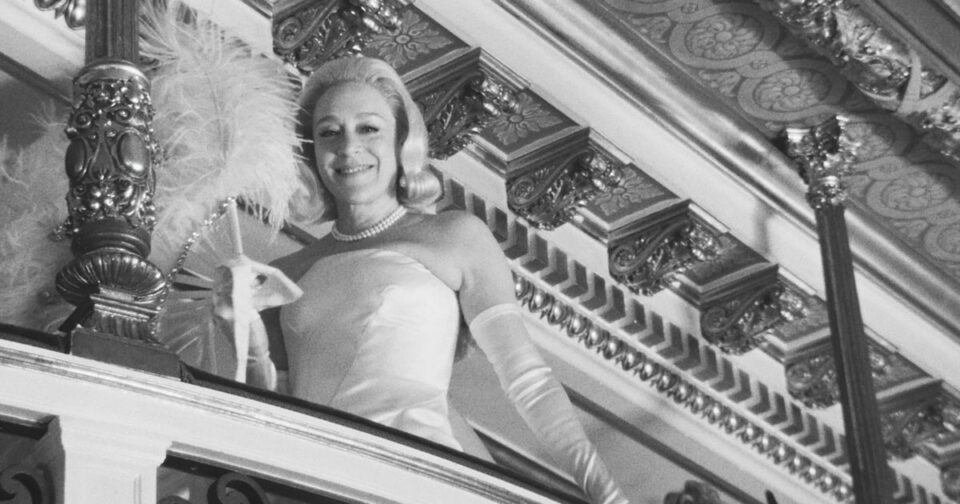The year 1966 was pivotal for Truman Capote. That’s the year the author published his most celebrated work, In Cold Blood. A pioneering work of nonfiction (and of the true crime genre that continues to define contemporary American popular culture), Capote’s explosive exploration of a brutal 1959 Kansas murder made him the toast of the town. That same year, the writer was followed by Albert and David Maysles, who’d eventually become a powerhouse documentary film duo behind such films as Salesman (1969), Gimme Shelter (1970), and Grey Gardens (1975).
Using such a factoid as the conceit behind “Masquerade 1966,” Feud: Capote vs. The Swans structures this third episode around those days the Maysles brothers spent with Truman with cameras in tow. Shot in black and white and meant to stand in as both a rough cut of what the brothers shot (if not the daily rushes of their time spent with Truman), the episode is a brilliant way to deliver several revelations regarding the titular figures in FX’s limited series. Fourth wall-breaking and to-camera interviews allow Babe, C.Z., Slim, and Lee to be candid about things they wouldn’t have otherwise shared.
But of course, at the heart of it all is Truman, who’s eager to celebrate his success — and what it means for American culture — with a ball. A masquerade ball at that, where all guests must wear only black and white and a mask to make it all the more interesting. He’s intent on making it the social party of the season, with his invitation list a closely guarded secret, a way to get in some folks’ graces and to keep others out.
The episode opens with Babe and Truman shopping for art (should she get the Manet or the Monet?) and establishing, perhaps a bit too thickly, just how thick as thieves these two were: “God knows I’m not easy to love,” Truman exclaims, only for Babe to say he’s an original, whose loyalty can be counted on. “For me, you are the beginning and the end,” he says. “You are the center of my world.” We know how that mutual adoration will sour. But for now, it’s air kisses all around.
It’s fascinating to place all of these characters under a documentary crew’s intrusive and watchful eye. These women, after all, are constantly aware of the eyes on them. They dress the part as much! Nevertheless, they struggle with acting naturally with a camera near them (the proto-reality 1973 TV series An American Family is only a few years away). No one in the United States had yet mastered, let alone thought about, what it would mean to have one’s real life so nakedly put on screen. And so you watch the Swans carefully navigate their behavior while dining with Truman, but also how best to voice their thoughts during confessionals.
In those moments, they most seem to play into Truman’s hands. At one point or another, they all believe they’ll be the ball’s guest of honor (a secret the author keeps for maximum effect if not outright emotional manipulation). They all think they deserve it, and each says as much. To a camera no less — an interesting artistic gambit Feud utilizes to great effect, allowing us access to their interiorities in ways mere dialogue couldn’t do as efficiently.
Ahead of the ball, we see how useful Capote was to his swans. C.Z., in particular, whom he consoles as the IRS begins seizing her assets once her husband’s business flounders after being nationalized in Mexico, but Babe also has to suffer through socially interacting with one of Bill’s mistresses. The writer is there for his friends, for his beautiful swans. But as we see him talk with Albert Maysles, you start seeing the rich artistic possibility of chronicling the world he’s now enmeshed in; it’s Albert who quotes Saint Terésa de Ávila to Truman in regards to his swans: “More tears are shed over answered prayers than unanswered ones” and gives him the idea for his Proustian project about them.
But before that, he gets to throw a fabulous ball to announce a new kind of American royalty. One based on meritocracy (no, really). Despite Babe’s help, the masquerade ends up being a bit of a trashy affair (who serves chicken hash at a ball?) and serves as a way to further create tensions between Truman and his swans. In the end, the guest of honor is none of them — it’s Kay Graham, the editor of the Washington Post. As Truman put it, it was proof that a new era was being ushered in.
And at the center of it all is Capote. A short Southern writer whose pettiness leads him to stage the most cruel moment of the entire episode when he unmasks Ann (Demi Moore) and humiliates her in front of her son by asking her to leave. It’s a challenging moment to watch but a reminder that here she’s playing Ghost of Christmas Past (since we’re squarely in 1975 for the bulk of the show) and Ghost of Christmas Future (since soon enough Babe and her ilk will find themselves just as used as Ann for Truman’s playful work). It’s a heartbreaking scene that proves just how drunk with power he felt. And actually drunk.
Right now, it’s all still fun and games. But there are enough hints that his parlor tricks are wearing thin on some (Lee, who lisps and mocks him to Albert, in particular). And it’s what leads him to think of what’s next. A book, perhaps. Why should Albert have all the fun chronicling this world?
“The material is better as a book,” Truman insists. “It needs my clarity. My process of distillation.”
And so there we have it; here lies the origin story for Capote’s Answered Prayers, apocryphal as it may be — especially once you see the short film the Maysles created from their time with Truman. But further enjoining Capote’s narrative ideals with the kind of documentary filmmaking the Maysles would come to be known for, Feud reminds us how groundbreaking their twinned approach to nonfiction storytelling — camera and pen alike became, in their hands, modes through which to see real life unfold without obstruction. Whether the “fly-on-the-wall” approach would have worked for Answered Prayers is dubious since it would have required a dispassionate approach. He was allowed into rooms few other writers were privy to (Gore Vidal, perhaps most famously), but there was a transactional reciprocity at work with the swans, one which was broken the moment he stopped being a fly on the wall and became a recording camera of his own.
Wit vs. Beauty
• Not to quote Ms Aretha Franklin, but how beautiful were those gowns? To die for, really: you can learn more about the event here.
• The Maysles’ Truman documentary was known both as A Visit with Truman Capote and With Love from Truman). Unlike this fictionalized vision of the filmmakers’ rushes, the short they actually produced did focus on Capote’s literary success with In Cold Blood. It features Truman at his most verbose, handily discussing his budding new genre (“the nonfiction novel”) and giddily bantering back and forth with the filmmakers and his interviewer alike. It’s a consummate portrait of the artist as an ambitious young man.
• May Capote vs. The Swans result in Calista Flockhart and Demi Moore (arguably two of the most memorable stars of the ‘90s, of screens small and big) getting more work of this caliber. Namely, the kind that allows them to chew scenery like the actresses-cum-divas they are and deserve to be.
• Oh, and we saw Lange chew the scenery again as Truman’s mom, the person the writer was clearly throwing the ball for, momma’s boy eager for her approval as ever.
• In trying to reason with Truman at the party, Moore’s Ann quotes his own work, noting that the only unpardonable sin is “deliberate cruelty.” Capote is pleased by having his words thrown back at his face, yet the short story from which the line comes (“there is only one unpardonable sin — deliberate cruelty. All else can be forgiven.”) wasn’t published until a year after Capote’s ball. It’s a pithy fact check, but one which could easily have been fixed had Ann and Capote opted to quote Tennessee Williams’s Blanche DuBois instead, who’d but uttered those same words decades earlier: “Some things are not forgivable. Deliberate cruelty is not forgivable. It is the one unforgivable thing in my opinion, and it is the one thing of which I have never, never been guilty.” (Also, did anyone else catch the Williams portrait in Truman’s home?)
• Is there a more depressing line in this episode than Babe — in talking about cardstock (!) — saying, “Everything must always be perfect. No more. No less. Just perfect”?
• Don’t mind me, I’m just Googling Yul Brynner for, ahem, no particular reason.
• Here you go: in case you wanted to see the Diego Rivera painting of C.Z. Guest.
Manuel Betancourt , 2024-02-08 04:16:24
Source link


